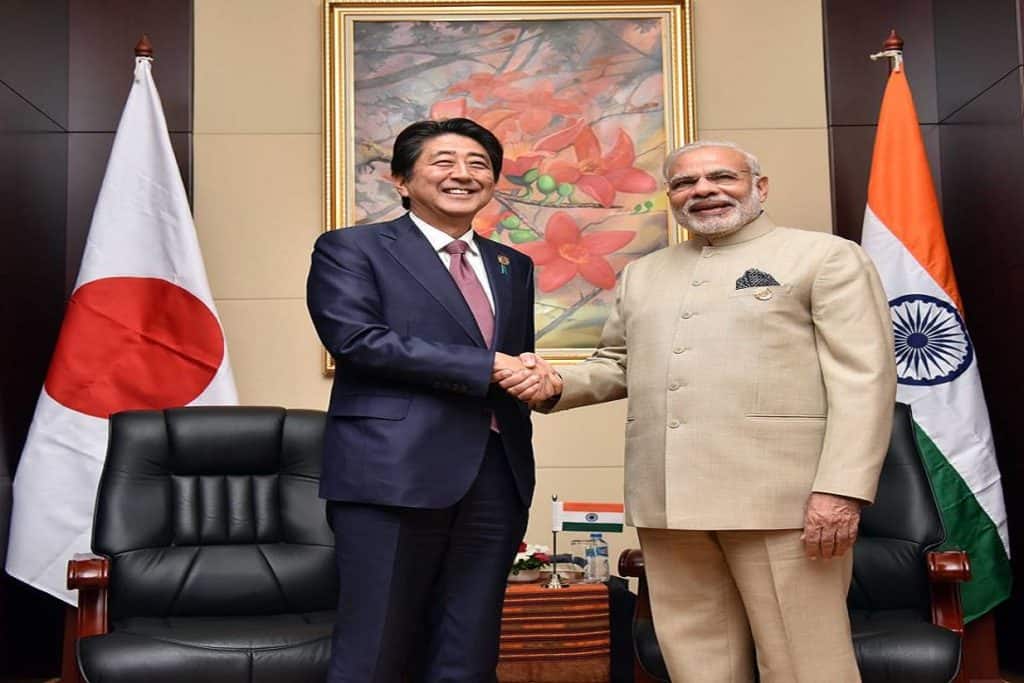By Denis Korkodinov
India and Japan began the path to mutual rapprochement. The prime ministers of both states, Narendra Modi and Shinzo Abe, are going forward to form a “united democratic alliance” against China.
The desire of Western countries to combine their efforts in the fight against probable external threats has traditionally caused a certain envy on the part of their Asian partners. The North Atlantic Alliance gave rise to the hope that in the near future a similar structure might appear in the Central Asian region. And while the US president was only thinking about creating an international coalition against Beijing, India and Japan have already on the way to create such a coalition.
It is worth noting that for Washington the threat from China is much more obvious than from Russia. More recently, during the Cold War, Western countries were united by a common desire to resist the “Soviet expansion.” However, now this goal is likely to be the cause of centrifugal tendencies in the existing alliances of the West. So, if for the UK the “Russian threat” is still important, as evidenced by the recent events in Salisbury, for France, this threat takes only a second level after the threat of international terrorism, and for Italy the “Russian threat” is not at all fundamental. Whereas for the United States, China is obviously becoming the “number one enemy”.
Similar transformations are observed in the countries of Eastern Europe. In particular, Poland still tries to treat Moscow exclusively as an “evil empire,” while Hungary adheres to neutrality.
Given the mistakes of Western alliances, India and Japan clearly demonstrate the existence of a common vision in the system of geopolitics, as well as with respect to China, which seems to them a threat far more terrible than Russia.
It would seem that India and Japan have nothing that could really bring them together: there is no common religion, culture, historical heritage. Nevertheless, a fundamental element of the friendship between the countries was their exaggerated perception of the Chinese threat, which served as a motive for creating a military-political alliance.
Japan, ranked third in the world in terms of economic development, it was developing along the path of classical liberal democracy. However, it is difficult to call India a liberal and, moreover, a democratic country. Like China, it is familiar with manifestations of corruption on a national scale, but, unlike China, in India, the rule of law is much more important. In addition, the nationalist ideology is developing very actively in India, which is obviously not enough for Japan. But, nevertheless, these countries are going united.
And in this pursuit of unification, India and Japan may have allies in Australia and Indonesia. And the reason for this is not even that these countries are negatively disposed towards China. Simply, they eagerly wish to get rid of the custody of the United States, by virtue of which participation in the Japanese-Indian alliance for them is like manna from heaven.
It is noteworthy that Donald Trump is well aware that with such a rapprochement between India and Japan, the United States can lose Asia forever. Therefore, now for him the confrontation with Russia, which has certain levers of influence in the Central Asian region, is not so important. Moreover, he is not even interested in being in alliance with Europe, as evidenced by his harsh attacks on Angela Merkel and Emanuel Macron. And even when Donald Trump says that “Europe must pay for the defense,” he also means that the United States must ensure the defense of India and Japan from China at the expense of Europe.
This is probably the main contradiction of American policy: on the one hand, Donald Trump does not want to strengthen the Japan-India alliance, but on the other hand he understands that there is no other alternative to “curb China’s imperial ambitions” in Asia. Because of this, he is forced to somehow support the “mutual attraction” of Shinzo Abe and Narendra Modi.
Therefore, Washington, despite obvious doubts, will still not prevent India and Japan from strengthening mutual relations. In this case, there is a very high probability that the Japanese-Indian alliance may become a kind of Asian NATO. And the United States will have to reckon with this.
(The opinions expressed in this article are solely those of the author and do not necessarily reflect the views of World Geostrategic Insights)







